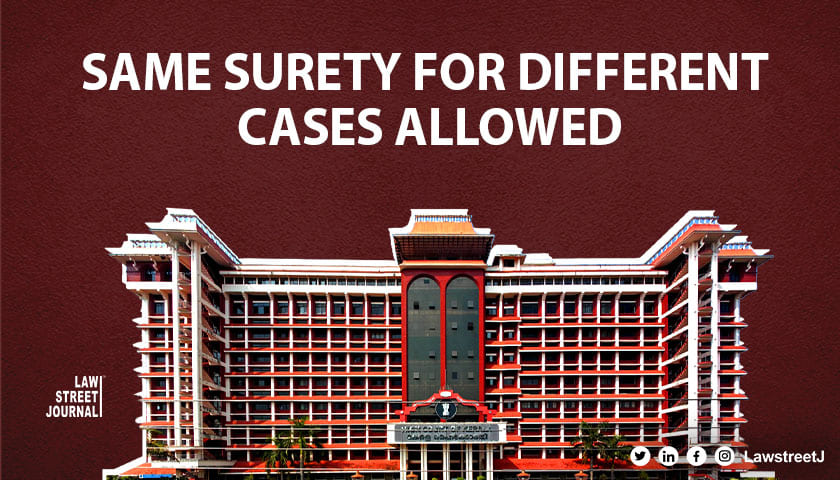In a significant judgement, the Kerala High Court came to the aid of an accused who had 1726 crimes registered against him. He moved the High Court after he was asked to produce separate sureties in each of his bail application.
Justice Bechu Kurian Thomas noted that since petitioner is facing accusations in 1726 crimes, if separate sureties are to be furnished in each of the cases registered against him, he will have to produce more than 3400 separate sureties. This is practically impossible and renders the concept of bail illusory.
Insisting on separate sureties for 1726 cases can render the said condition incapable of performance, and the liberty of the petitioner may remain a mirage. Law does not prohibit the same surety being furnished in different cases.
The High Court then highlighted that the insistence on sureties and execution of bail bonds cannot be another ordeal or a punishment for the accused.
If the surety furnished can inspire confidence of the court on his ability to ensure the presence of the accused during trial, there is nothing that restrains the court from accepting the same surety in all the different crimes. Even the value of the bond cannot be insisted to be commensurate with the quantum involved in a crime. The courts must bear in mind that insistence on sureties and execution of bail bonds cannot be another ordeal or a punishment for the accused.
Advocate CS Manu, the counsel for the petitioner submitted that some of the courts are insisting on different sureties to be furnished for each case and considering the large number of cases registered against the petitioner, it is impossible for him to obtain or produce different sureties. The High Court was further told that some of the Courts insisted on separate sureties to be provided for more than a particular number of cases. For instance, a Kollam court had refused to accept the same sureties for more than 20 cases.
Public Prosecutor Ashi MC pointed out that petitioner has not produced any order refusing to accept the sureties, and therefore, the reliefs now sought are based on assumptions.
At the offset, the court noted that the conditions imposed while granting bail cannot be too onerous or incapable of performance rendering the bail granted illusory and even redundant. However, instances are numerous where the trial courts impose conditions that make the liberty ordered chimerical. This case indicates the hardships of an accused involved in numerous cases.
The Court stated that orders for release of an accused on bail cannot be frustrated by the conditions imposed or the bonds directed to be furnished. For this, the judge relied on two provisions.
Section 440 of the Code of Criminal Procedure contemplates that the amount of every bond shall be fixed with regard to the circumstances of each case, and the same shall not be excessive. Section 441 CrPC lays down the nature and contents of the bail bonds to be executed by the accused and sureties before a person is released on bail.
The purpose of having one or more sureties is to ensure that the accused will appear for trial. Section 443 Cr.P.C. takes care of the situation where the sureties provided are found to be insufficient at a later point of time or when a mistake or fraud is committed.
The court proceeded to explain that insisting on sureties and executing a bail bond is only to secure the presence of the accused during trial. The surety is not a person who can be called upon to guarantee the sum of money involved in the crime. The surety only guarantees the presence of the accused during trial and not for any money due from the accused.
Sometimes a surety without any property can, by virtue of his respectability in society, be a better surety than one with immovable property. Therefore, it is not wholly prudent to correlate the quantum involved in the crime with the surety bond or fix a particular number of cases for a particular surety or to restrict a surety to stand as a guarantee only for a particular type of cases.
When bails are granted against accused with many crimes registered against them, it was a recurring practise that an additional condition was placed on furnishing separate sureties or to furnish bonds commensurate with the quantum involved in the criminal case. This is not based on any legally tenable principle and is in fact opposed to law, the judge clarified.
The Court also noted that insisting on court fees to be paid on petitions filed by accused who are in custody is also contrary to Section 72(xiii) of the Kerala Court Fees and Suits Valuation Act, 1958.
On these grounds, the Court directed not to insist on separate sureties in all the cases. As long as the surety is solvent and inspires the confidence of the courts, insistence on the production of separate sureties for each case is opposed to law.
Read Order








![Kerala HC Quashes 498A Dowry Harassment Case Against Live-In Partner, Citing Lack of Relative Status [Read Order]](/secure/uploads/2023/08/lj_5693_1057c042-1e57-4e27-8c9e-25af0ec38ec4.jpg)
![Watching porn on mobile: Kerala HC highlights importance of mother cooked meals, outdoor sports [Read Order]](/secure/uploads/2023/09/lj_9155_Parental_supervision_of_mobile_phone_usage.jpg)
![Lakshadweep MP Mohammed Faizal Disqualified from Lok Sabha After Conviction Suspension Plea Rejected by Kerala High Court [Read Notice]](/secure/uploads/2023/10/lj_9640_87b5fd97-0e05-4ff8-9a99-3be1e4446192.jpg)




